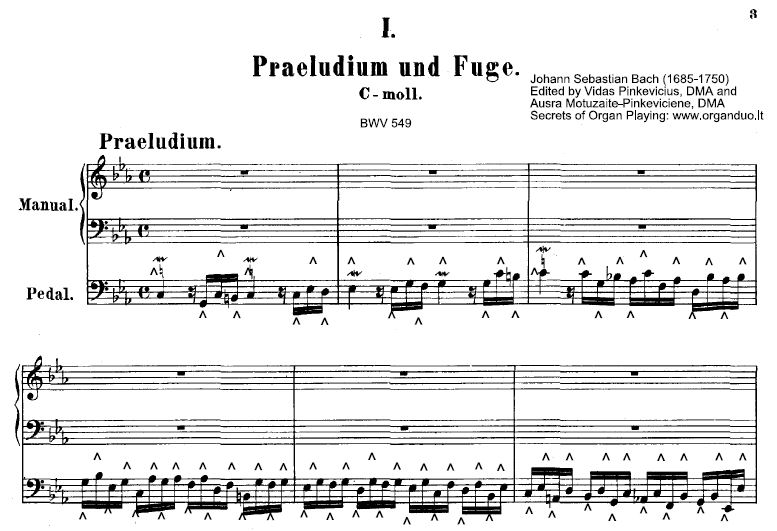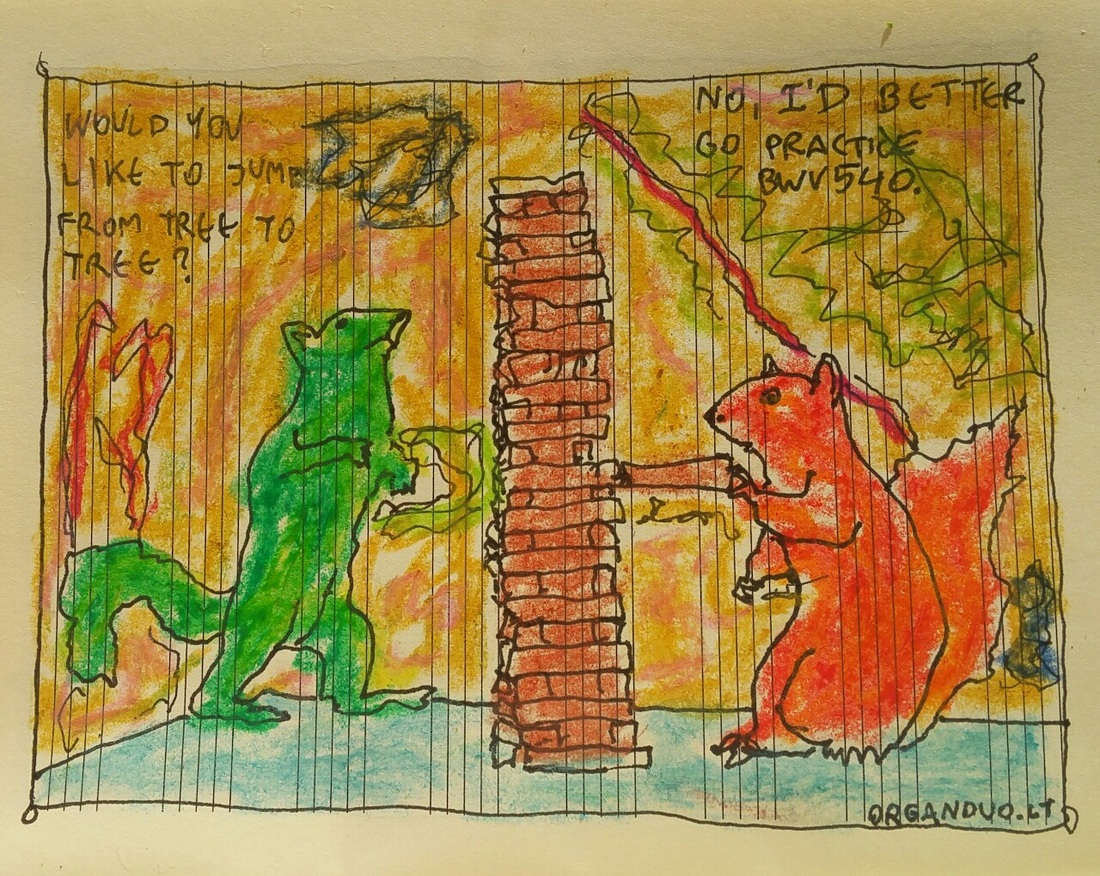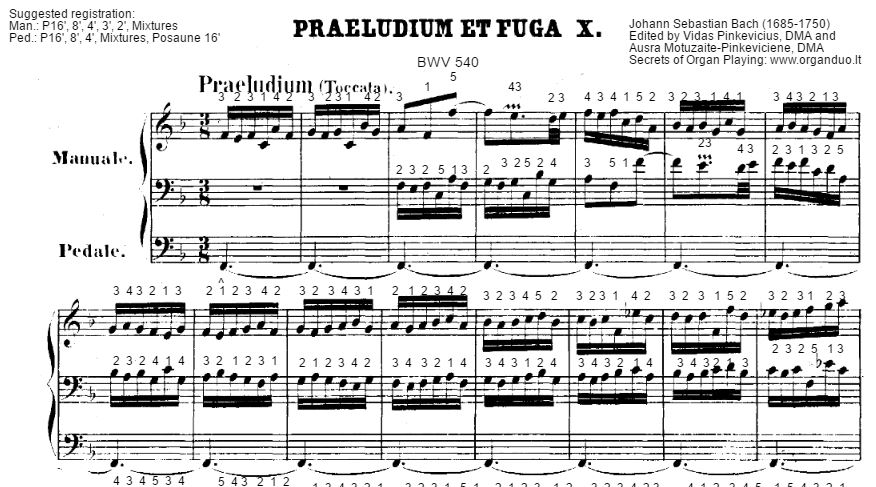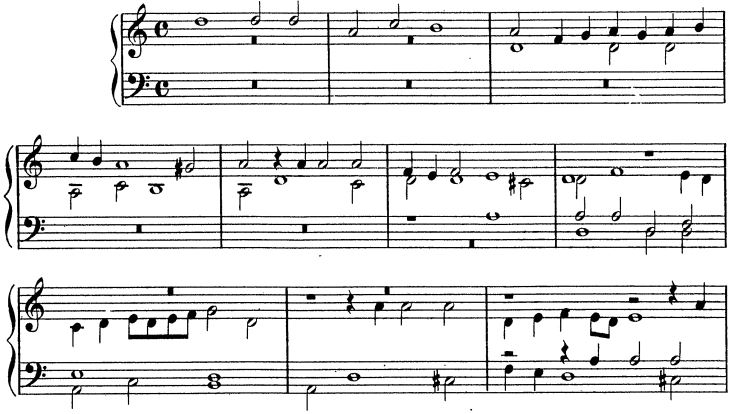|
Some people learn organ music from videos and some - from scores.
It seems that looking at the video performed at the super slow practice tempo where my hands are visible, enables organists to copy my movements. Others simply look at the score with complete fingering and pedaling provided and figure out the movements by themselves. At the request of my students, I'm now offering a separate practice score with complete fingering and pedaling of Bach's Prelude and Fugue in C Minor, BWV 549 for easy and efficient practice.
Comments
I first learned to play Bach's Toccata and Fugue in F major, BWV 540 some 15 years ago when I was a student at Eastern Michigan University.
I remember my professor Pamela Ruiter-Feenstra sharing her idea with me about the amazing opening canon between the two upper parts. "It's like two squirrels chasing each other", she said. What happens after this canon is one of the most impressive pedal solos in Bach's output which is followed by an inverted canon and another pedal solo in the Dominant key. What happens next? Well, maybe the two squirrels join forces. Maybe they perform pirouettes in imitation jumping from the tallest to the shortest pine-tree. It all continues for quite some time until the end of the Toccata. The fugue is another matter all together. It doesn't have the playfulness of the Toccata. It's a double fugue, the first part being written in a tradition of the old ricercar (Stile antico) with long note values. Maybe the squirrels are tired after jumping for so long and they fell asleep and maybe they are having a dream about the tallest oak in their neighborhood and on top of that oak seing a giant acorn. The second theme of the fugue reminds of Gavotte with its long-short-short rhythms (Figura corta) which symbolizes joy in the Baroque rhetorical language. Apparently the squirrels have climbed this oak and started to work joyfully on cracking this giant acorn. In the last third of the fugue, the two themes join forces because Bach skillfully combines them in invertible counterpoint. Here our squirrels perhaps call on help of their friends and relatives and finally they can have a solemn and festive acorn dinner together (except it's all a dream, remember?). BWV 540 is a long composition (15 pages). In fact, it might be a very boring piece to listen to, if the organist ignores the fantastic harmonic devices, modulations and imitations and takes it too seriously. At the request of some of our students, I'm releasing today my new 15 week BWV 540 Training. It has training videos and a practice score with complete fingering and pedaling for easy and efficient practice (50% discount is valid until October 26). Because a few of my subscribers asked for it, this morning I've finished writing in fingering and pedaling in Bach's Trio Sonata No. 1 in Eb Major, BWV 525 for easy practice. If you like this piece and plan to learn it, now is the best time because this score is with 50% discount until September 15.
Check out the score Ever wondered what computer scientist has to say about the music of Bach? It turns out that a lot things many of us are not even aware of. If you like the music of Bach and have been fascinated by numbers, here's the thoughtful and insightful radio show from On Being featuring Bernard Chazelle that you don't want to miss.
Sight-reading: Componimenti by Adriano Banchieri (1568-1634). He was an Italian composer, music theorist, and organist of the late Renaissance-early Baroque period. Hymn playing: Rejoice, O Pilgrim Throng Last week, just before Bach's 329th birthday, I asked the readers of this blog to submit their answers to the question of why do they like Bach and his art.
I would like to thank personally not only each and every one of you who replied but also who considered. Each answer is amazing on its own right but when we put all of them together - we get something remarkable, I think (If you feel the urge to share this post with some of your friends, don't hesitate - they will thank you for it). Here is what I received - not in any particular order (the language is original): Patti Whaley, UK: Bach sets the world to rights. Everything else may be crazy, chaotic, misguided, or disappointing, but Bach never lets you down. A Bach fugue restores order to the cosmos. John Higgins, Australia: It is incredible how Bach's music has lasted the test of time, surely this is the final proof of greatness! His music can be appreciated by anyone, yet it contains layer after layer of intelligence, creativity, and structure. Bach wrote his music for the glory of God and the uplifting of the human spirit, surely God has honoured him for this. Lutz, Germany: In all the complexity of his polyphonal work the individual voices seem to be alive like little children which play together, each one at its own pace, but continously uniting in a rhythmic manner. By this you feel life under your hands. And Bach almost never manages to come to an ending, his music continues and continues and continues, ... until he finally almost forces an ending. By this you feel eternity under your hands. Jaydee Price, South Africa: Bach is undeniably a colossus amongst composers - both past and present and his supreme genius transcends all boundaries known to man, be they natural or spiritual. Our human life-span is far too short to fully comprehend, experience, fathom or quantify the mind-boggling contribution that Bach has made to our lives and to our music. I will forever be inspired, amazed and enthralled by this great man, who has given credence to, and also unequivocally answered Shakespeare's question: "If music be the food of love..." Bach has also proven that music is additionally an inexhaustible source of inspiration, refreshment and sustenance for the soul... Leon Green, USA: Bach gives confidence that with regular work, even less than stellar talent can produce stellar work. Christo Kritzinger, South Africa: The fact that, for over 300 years Bach has influenced the lives of thousands of people and this is still happening every single day, makes him in my opinion a world hero. Only the genius BACH could do that. Rachel P., California, USA: Anyone who is seeking not only meaning in the human condition but also Christian belief as a transformative experience of that condition has a resource in Bach’s faith inspired works, paradigmatic in the St. Mathew’s Passion and the Mass in B minor. Here Ludwig Wittgenstein, insight is relevant: Bach said that everything he achieved was the result of industry. But industry like that presupposes humility and & an enormous capacity for suffering, strength then. And anyone who in addition can express himself perfectly, simply addresses us in the language of a great human being. MS 137 40b: 28.5.1948 Lucas Tomlinson, USA: I recently came across a book titled "Bach's Dialogue with Modernity" written by John Butt. In it he discusses how Bach is able to simultaneously hold modern and pre-modern ideals in his settings of the Passion narratives. I find this quite compelling in Bach and look forward to discovering more of this. Tony Forward, UK: Such skill is a gift from God so it is fitting that such music is a gift back to God. Ferenc Lakatos, Slovakia: Since a few days ago I had my birthday, I will link the events together :-) About Bach I heard first time from my father, who was his admirer and being violinist played almost daily his Sonatas et Partitas, so I had Bach's music in my blood from my childhood - till now I am considering his Sonatas and Partitas for solo violin as the absolute top of music at all....His Chaconne can take you to heaven.My father also adored organ music - he tried sometimes to touch the keys of organ in our town church, but he stayed violinist. Hence, I fell in love with organ when I was very young, and organ for me was equal with Bach and his unbelievable beautiful music. I often listened together with my father Bach's organ music and when possible we visited churches and cathedrals to enjoy something special, not intended for everybody - this is a pity, because people who do not know him, or do not like his music, they lose a lot - a whole wonderful world.... So, why do I like Bach and his art? - because he and his music is an integral part of me, like drinking, eating or breathing... Jack Kenefick, Ireland: One special thing about Bach is his unique ability to write such special bass lines for pedal. I refer specifically to O Mensch Bewein and note the in-step pedal motion passing between root notes, 1st inversions, 2nd inversions and the occasional surprise. Michael Grieve, Australia: I love Bach's music because it reflects all of our human emotions. There is Joy, Happiness, Reflective Meditation, deep sorrow - Is est volbracht listen to Marion Anderson T. Rachel Keehner, USA: Bach is the past musician/composer I am inspired by the most, even as my studies have introduced me to the lives and work of an increasing number of composers and musicians. The connection between his faith, life, and music is strong, and his work presents both technical complexity and musical artistry in profound ways. I find his legacy to be one that acknowledges the past while pointing forward and inspiring the future. Peter Hallam, UK: His music is like an ever flowing stream that passes through the changes of scenery, with varied tempi and often unfathomable depths. Gerrit Gerrit, South Africa: To me J. S. Bach’s music is like a beautiful glass object – one chip though and it all shatters. Martin, Martin Australia: Two young church organists got married March 21, 1963 determined to keep alive their musical endeavours. Each year they prepared one of the 48 preludes and fugues and played as a duet, on piano and organ, on their anniversary. One partner passed away before they could perform number 40. The other maintains the practice and completed 48 two years ago. To them, the preludes speak of initiative and innovation; and the fugues of the give and take, and final balance of married life. The anniversary is a time of happy reflection and sincere gratitude to Mr Bach for his embedded marriage counselling. Anne Kimball, USA: The music is so well thought out that when I play it, I feel what it must be like to be an artistic genius. I have to be totally focused to play his music. David Gotch, USA: Well, first off, here it is March 21st, and I haven't really started what I wanted to start doing today. I want to write a Quodlibet of some sort (probably for a string quartet), in the style of Bach. Yes, four different themes going at once. I need to get some inspiration for doing just that. So, I am going to attempt to listen to a bunch of Bach's music today, and start that Quodlibet ASAP. Now, the reason that I LOVE Bach's music is that it is very often a total blend of mathematical AND artistic (lyrical?) sounds occurring SIMULTANEOUSLY. There are composers who have written mathematical types of compositions, and there are those who have written artistic (lyrical?) types of compositions, but to my knowledge, NO composer has done that, or at least done that as WELL as J. S. Bach has. All said, Bach's music is like hearing the mathematical logic of Einstein COMBINED SIMULTANEOUSLY with the beauty of a great Rembrandt painting (expressed in musical terms of course). WOW. TOTALLY AMAZING! Erwin Vijfvinkel, the Netherlands: I like Bach and his art, not because of the mathematics behind it, but because the music expresses my devotion to God and simply touches me over and over again. Heidi Miller, USA: I like Bach and his art not only because of the genius of his music, but because his music touches that part within me that is connected to God. No other composer does it for me in so profound a manner. Angelika Brandt, USA: Bach's music transcends humanness. It exhilarates my body, mind, and spirit. As a Lutheran church organist, it takes me to the throne of God where I make my humble human offering. Afonso Torres, Portugal: Bach is perfection itself. Bach was great and yet humble. Bach is amongst us, musicians; if we listen carefully we can hear his breath: music itself. One speaks of Bach as if he was a king but Bach never was a king. Bach served the King of Kings and he was great. Rory O'Brien, Ireland: You have made us for yourself, O Lord, and our hearts are restless until they find their rest in you. Meanwhile, we feel grateful for Johann Sebastian Bach and his music. Serena Tan, Singapore: I just realised Bach has the same birthday as my mum. His music brings joy to me and makes me want to learn more about the pipe organ. Daniel Tsukamoto, USA: Bach has a way to thread music themes in such an intricate way that it makes sense afterwards. Fugues are his specialty. Frank Mento, France: I like Bach because he is so profound and complex. I think no other composer has ever attained the degree of structural complexity and architectural beauty as Bach. Michael Rowlands Jr., Irving, Texas, United States: I Love Bach because of his mastery of Counterpoint and emotion in his music. And the Fact that he was a Godly musician. :) Paulius Grigonis, Lithuania: I regard Bach's music with awe because of its spirituality and depth. Whenever I take on to play his pieces, I view it with great responsibility. Tristan Krahn, Abbotsford, Canada: I Enjoy Bach's music because it was incredibly proficient and complex for the era it was written in and set the standard for future generations of musicians. I have spent part of today listening to Glenn Gould's second recording of The Goldberg Variations and Gould's only organ recording which was 9 of the thirteen parts of The Art of Fugue. I enjoy these pieces because they show the complexity of the genius of Bach's compositional abilities. Goldberg in particular shows just how dedicated to his craft he really was by taking an aria and composing thirty different variations on the original piece. It gives me the drive to create such things in my own art, to be able to create then create mutations of my creation that are different but incredibly similar to the original piece. Genevieve, Canada: Bach's music absorbs me in an evanescent vortex where nothing exists but pure harmony, away from all this planet's troubles. When it stops, it is like a crash-landing, but somewhere inside me a memory remains and makes me smile. Steven Monrotus, USA: Bach was a comprehensive musical genius and arguably the greatest musical mind who ever lived. If all the great music of the world, except for Bach’s, were to be irretrievably lost, music would still survive. All great music since him can trace its origin back to him, and all great music before him merely leads up to him. With some composers, when you know one of their pieces, you know them all. With him, when you know one of his pieces, you know only one. His masterpieces speak across the centuries to all people, everywhere. Vidas Pinkevicius, Lithuania: I think its totally amazing how Bach can unify people from so many countries, age groups, occupations, political views, even religions. Bach transcends all of us. Thank you so much for your answers. It's been a great idea to ask you this question and share all the answers with others. We could do this more often. Thank you for being a member of Secrets of Organ Playing community. |
DON'T MISS A THING! FREE UPDATES BY EMAIL.Thank you!You have successfully joined our subscriber list.  Photo by Edgaras Kurauskas Photo by Edgaras Kurauskas
Authors
Drs. Vidas Pinkevicius and Ausra Motuzaite-Pinkeviciene Organists of Vilnius University , creators of Secrets of Organ Playing. Our Hauptwerk Setup:
Categories
All
Archives
April 2024
|
This site participates in the Amazon, Thomann and other affiliate programs, the proceeds of which keep it free for anyone to read.
Copyright © 2011-2024 by Vidas Pinkevicius and Ausra Motuzaite-Pinkeviciene.
Terms of Service and Privacy Policy
Copyright © 2011-2024 by Vidas Pinkevicius and Ausra Motuzaite-Pinkeviciene.
Terms of Service and Privacy Policy








 RSS Feed
RSS Feed